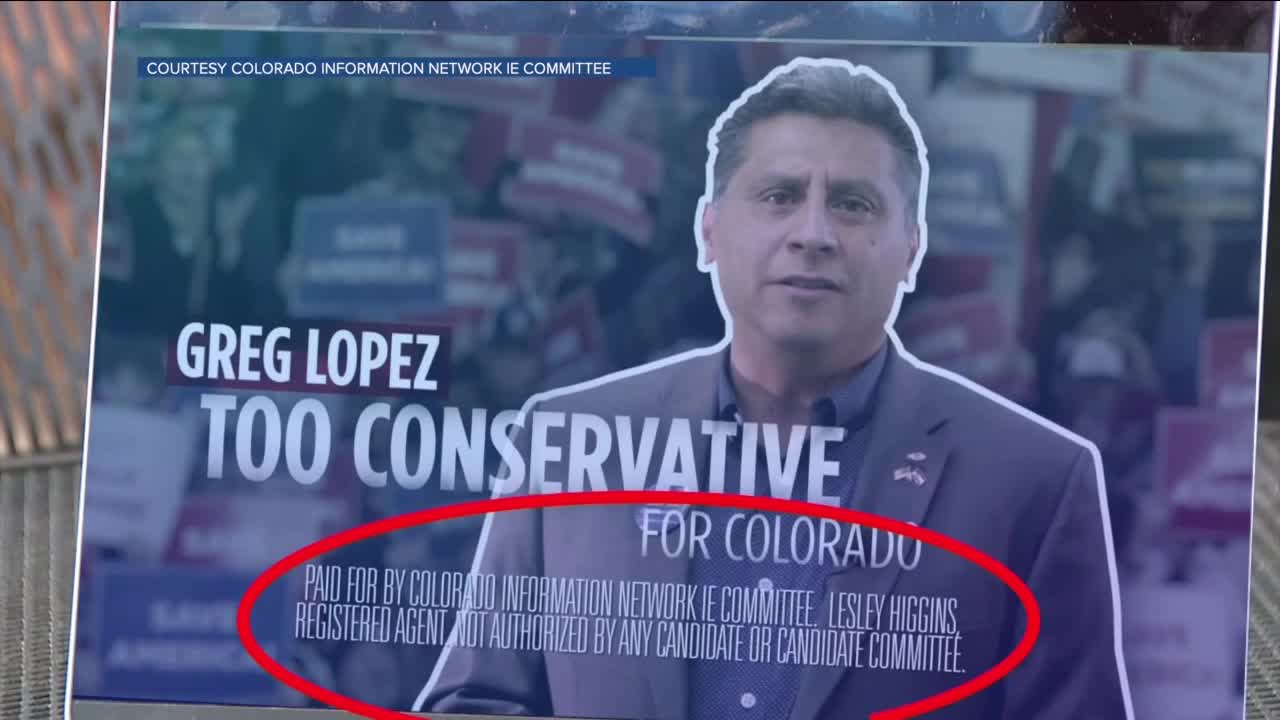DENVER — On its face, it looks like an attack ad — one trying to convince people participating in the June Primary not to vote for state Rep. Ron Hanks for U.S. Senate.
The ad calls Hanks too conservative for Colorado, saying he wants to ban abortions, build the border wall and increase access to guns among other things.
It uses similar language to one that targets gubernatorial candidate Greg Lopez.
That one says Lopez supports Donald Trump, opposes gay marriage and is unapologetically pro-life. It also ends with a line saying Lopez is too conservative for Colorado.
“What's surprising is that the too-conservative-for-Colorado has been used. I've been here 33 years, and I've seen the same type of ads use that same language,” said Darin Duber-Smith, a marketing professor with Metropolitan State University of Denver.
Both ads were paid for by Democratic-leaning groups: the Hanks ad was paid for by Democratic Colorado while the Lopez spot was paid for by the Colorado Information Network IE Committee.
However, Republicans are crying foul with the advertising, accusing the groups behind them of trying to prop up the opposing candidates they want to win the primary.
The Effectiveness of Advertising
Political or not, Duber-Smith said the same basic marketing and advertising principles apply: branding and repetition.
“They do that over and over and over again, and eventually the target market learns that this candidate is whatever that word is, and in this case, it's the word 'conservative,'” Duber-Smith said.
In general, positive advertising performs better than negative ads because it evokes positive emotions and associations with a particular item or person.
The challenge of political ads though is that the groups behind the ad are trying to appeal to a wide audience with different ages, beliefs and backgrounds, so it’s difficult to tailor the language to be most appealing.
“You're certainly not going to appeal to the other side. So, in this case, I think this is a more targeted message — where you're trying to paint somebody as conservative, which to the one side is a bad thing, to the other side, that's a good thing. The question is, to the swing voter, what does that mean?” Duber-Smith said.
Bait and Switch
Republicans, however, say the ads targeting Lopez and Hanks are actually trying to do the opposite of what they purport and actually support the candidates the ads seem to attack.
One might think that GOP U.S. senate candidate Joe O’Dea’s campaign would be happy about a series of ads attacking his opponent before the primary. However, O’Dea’s campaign wants to make it absolutely clear that they had nothing to do with this.
“Among Republicans and conservative voters, people are angry. They see what the Democrats are trying to do. They see that they're trying to be manipulated,” said Josh Penry, a strategist with the O’Dea campaign. “This is just too far. It's dishonest and it's inauthentic.”
Penry describes this as a misdirection, saying the ads are actually meant to encourage conservative voters to pick Hanks in the primary by using buzzwords that would appeal to them.
Those buzzwords include: conservative, ban abortions, build Trump’s border wall, and increased access to guns.
With the Lopez ad, the words oppose gay marriage, unapologetically pro-life and conservative appear on the ad.
Penry believes Democratic groups are trying to prop up the candidates they believe are more beatable in the general election by U.S. Sen. Michael Bennet and Gov. Jared Polis.
So how would an attack ad prop a candidate up?
“Two things: massive name ID and basically a sales job that he's a conservative targeted to conservative audiences,” Penry said.
The group Democratic Colorado is spending $780,000 on the Hanks ads while the Colorado Information Network IE Committee is spending another $688,000 on the Lopez commercials.
It’s not only O’Dea’s campaign that has expressed concerns with the advertising, though. The state’s Republican party is calling the commercials a dark money attempt that highlights how vulnerable Democrats are.
"This is an insult to the voters of Colorado who won't fall for this deceptive, dark money interference in our elections. It's telling that the Colorado Democrats are so concerned about the failing candidacies of Jared Polis and Michael Bennet that they are choosing to waste millions of dollars in the Republican primary,” the statement from Colorado GOP Chair Kristi Burton Brown read in part.
Democratic groups, meanwhile, are contending that these ads are meant to do exactly what they say, pointing out to voters that these candidates are too conservative.
“We are starting the general election campaign now. If local politicians want to talk about the process instead of defending their candidates, that’s their business. Still, the GOP Senate candidates are totally out of step with Colorado values, and voters deserve to know the truth about who’s running to represent them,” said Democratic strategist Alvina Vasquez in a statement to Denver7.
In the past, Democrats have accused Republicans of using the same type of deceptive advertising tactic though, most recently with the primary race between John Hickenlooper and Andrew Romanoff.
Duber-Smith said he tends to not pay attention too much to political ads because they are too negative. For voters, though, he recommends that people do their research and look beyond the catchy commercials from either side before deciding what to believe.




